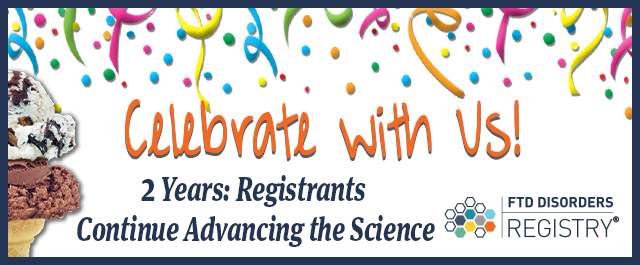PRESS & NEWS
2 Years: Registrants Continue Advancing the Science

As we celebrate our second enrollment anniversary this week, we are grateful that those affected by frontotemporal diseases are helping advance the science through their involvement with the FTD Disorders Registry (FTDDR). Since the Registry launched on March 28, 2017, some 2,373 persons affected by this devastating disease have enrolled, which includes persons who have…
As we celebrate our second enrollment anniversary this week, we are grateful that those affected by frontotemporal diseases are helping advance the science through their involvement with the FTD Disorders Registry (FTDDR).
Since the Registry launched on March 28, 2017, some 2,373 persons affected by this devastating disease have enrolled, which includes persons who have been diagnosed, family members, caregivers and friends.
On the first day when FTDDR went live, 10 percent of those who enrolled were persons diagnosed. During the past two years that has almost doubled to comprise 18 percent of the Registry total. Meanwhile, the remaining enrollment numbers have come to be evenly divided between the other two categories: Biological Family Members (40 percent) and Caregivers/Spouses/Friends (42 percent).
VIEW CHARTS FOR ENROLLMENT AND REGISTRY NUMBERS HERE
Contact Registry & Research Registry
FTDDR is an international Contact Registry and a North American Research Registry. During the past two years, the number of participants in each registry has been nearly equally divided. The first day saw the greatest gap with the Contact Registry at 58 enrollees (43 percent) and the Research Registry at 78 enrollees (57 percent). However, this has gradually changed where the Contact Registry currently has 1,247 members (53 percent) and the Research Registry has 1,112 members (47 percent).
The Contact Registry includes enrollees from all 50 U.S. states and 28 countries, with the majority of international participants residing in Canada, Australia, and the United Kingdom. On the first day the Registry opened, there were only 4 international enrollees which comprised 3 percent of the total. This number has increased to 7 percent with 172 members.
Research Registry enrollment is limited to the U.S. and certain Canadian provinces, and all persons who have completed research registration are also members of the Contact Registry.
Those who participate in research through surveys and clinical trials are providing much-needed information to advance the science so we can find treatments and a cure.
WAYS YOU CAN HELP
FTD is devastating, but there is hope. There are ways you can help:
Thank You for Celebrating with Us! This past week as the FTDDR marked its second enrollment anniversary, we looked back at the history and highlights, statistics and successes as well as the future opportunities for advancing the science and moving toward finding treatments and a cure for persons affected by the full spectrum of FTD disorders. Here is a list with links to all of the articles we posted:
Together we can help change the course of the disease and put an end to FTD.
Together we can find a cure for ftd
The FTD Disorders Registry is a powerful tool in the movement to create therapies and find a cure. Together we can help change the course of the disease and put an end to FTD.
Your privacy is important! We promise to protect it. We will not share your contact information.



